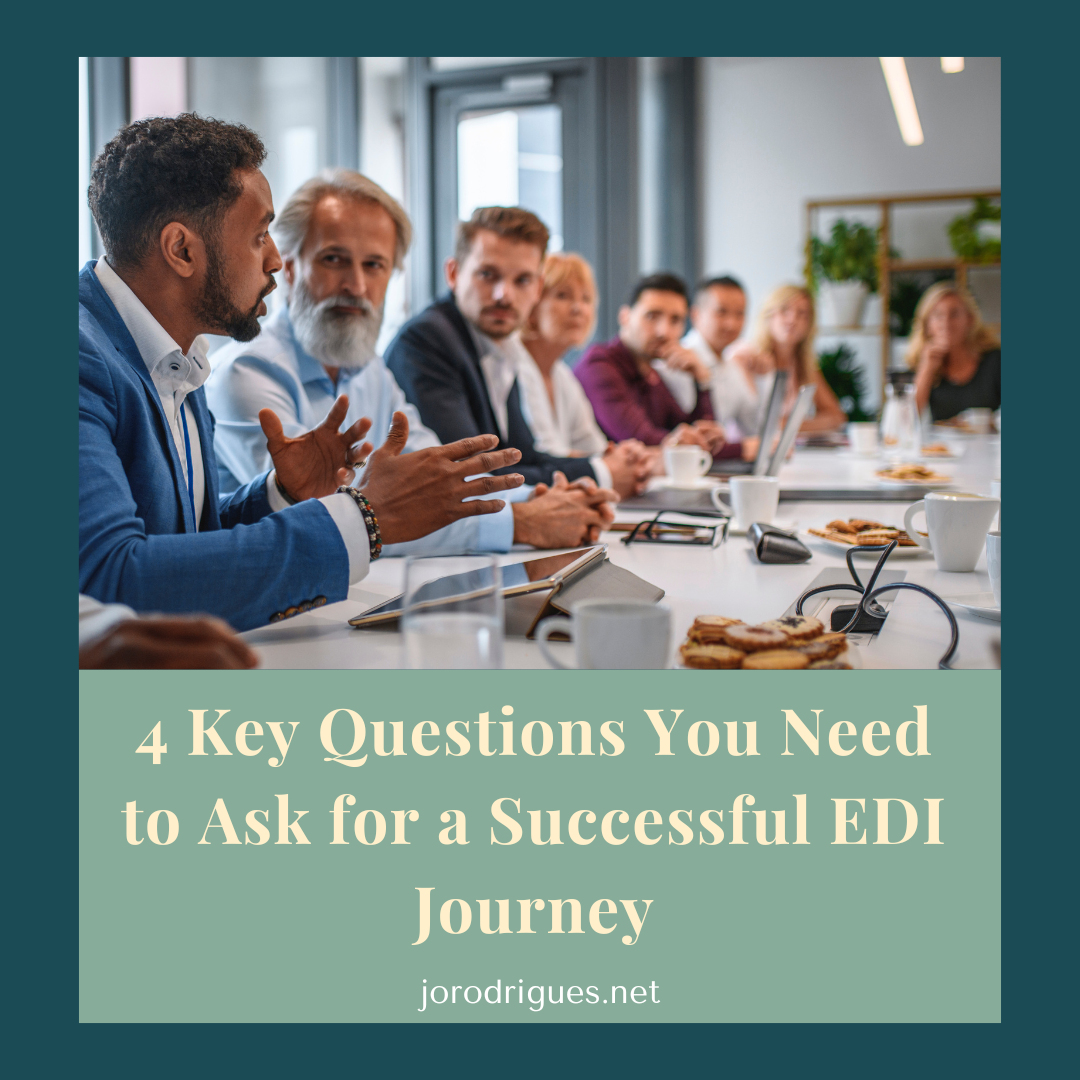Why do organizations and leaders need to ask 4 key questions for a successful Equity, Diversity and Inclusion (EDI) journey?
It’s because of 2 things:
1) the context and
2) EDI implementation plans damaging workplace relationships and trust in employer/employee relations
The Context
Our current reality is witnessing and experiencing:
- toxic workplace relationships,
- burn-out,
- The Great Resignation,
- an anticipated recession,
- continued systemic harm and abuse to Indigenous people
- the Black Lives Matter movement,
- #MeToo,
- #AidToo,
- the need to keep advocating for 2SLGBTQQIA+ rights, women’s rights and everyone’s human rights.
EDI Implementation Plans & Damaged Workplace Relationships
As I support organizations in identifying why they are meeting challenges with their EDI strategies, procedures and working groups, I hear this from some:
We acknowledge there’s a problem.
We’re listening and inviting feedback.
We are taking measures to address the issues.
But we’re not feeling that these efforts are truly acknowledged or appreciated by our staff. What can we do?
The statements and question are filled with urgency because organizations feel they have genuinely tried to meet expectations but haven’t gotten the anticipated result.
They’ve taken ownership of the problem, acknowledged their contribution to it and acted to address it. For some organizations, these actions demonstrate trying to make amends.
But the reality is these actions are resulting in negative outcomes like:
- EDI Employee Resource Groups (ERGs) voicing concerns related to experiencing tokenism, feeling unheard and feeling taken advantage of
- Organizations experiencing a high turn-over of C-Suite EDI leaders, managers and supporting staff
- Staff and leaders alike choosing not to say anything about unhealthy dynamics that are damaging EDI initiatives because they have witnessed or experienced being shut-down, shamed or abused as a result of speaking up in the workplace
- Destroyed mutual trust and a lack of psychological safety
For some, EDI journeys are resulting in damaged relationships and failures.
Why Some EDI Journeys Are Resulting in Damage and Failure and A Solution
EDI journeys are negatively impacted for 2 reasons.
Reason 1: Leaders, teams and the organization as a whole have not meaningfully engaged with 4 key questions.
The 4 key questions are:
- What are we specifically trying to remedy or act on and why?
- Is this specific act meaningful, wanted or needed by the receiving party?
- If not, what is?
- Now that we are clear on what specific action is meaningful, wanted or needed by the receiving party how does our budget support success on following through with actions?
Note the use of the word “specific.”
Too often, leadership teams and staff misunderstand each other on actions that appear simple enough.
For example, the leadership team’s understanding of an inclusive recruitment and promotions process can still feel and be exclusive to staff because assumptions have been made, by everyone involved, on what an “inclusive recruitment and promotions process” means.
Being specific avoids a lack of clarity or assumptions and has the added benefit of demonstrating transparency and accountability.
Avoiding a damaged or failed EDI journey, or recovering from one, requires answering these questions and acting on the answers.
Choosing not to, for whatever the reason, is leading to damaged and failed EDI journeys.
Reason 2: The second reason for damaged and failed EDI journeys is that all parties concerned underestimate the need to actively listening effectively.
The reality is that active listening:
- tests your ego and your resilience
- requires acknowledging the other person’s truth regardless of whether you agree with it or not
- requires understanding acknowledgement is not agreement
- requires a person to be fully present in their thoughts, emotions, actions and words.
If you’re not experiencing or doing any of the above when you’re actively listening, you’re not doing it effectively.
The reason it’s needed on EDI journeys is because the issues of discrimination, marginalization, colonization and racism touch on people’s lived experience, over years, inside and outside the work place. It involves emotion and different types of trauma.
Active listening takes this into account. It
- cultivates self-awareness and presence in you.
- jump-starts self-awareness and presence in the other person.
- establishes trust as a result of feeling acknowledged.
- creates conditions for you to be heard and acknowledged and
- creates an honest baseline to have a constructive conversation – even when parties disagree.
Developing and implementing an EDI journey is not the same as developing and implementing a budget or project management plan. This seems obvious enough and yet there is a distinct lack of understanding of how important a holistic, trauma-informed, mindful and budget-backed EDI implementation plan is.
To have such a plan requires a lot, including building everyone’s skillset in active listening.
If a person doesn’t feel heard, it is unlikely they will be able to listen or acknowledge you or your efforts.
If you or your organization can relate to these challenges, take a moment to stop. Use the pause to ask the 4 questions and apply all active listening steps.
It is possible to repair damaged EDI journeys, learn from failures and avoid losing trust.
I have no doubt you can follow-through with this because you’re here. You’ve invested your time to be curious and learn in order to make an impactful difference.
A nod of respect from me to you! You’ve got this!

P.S. Mindful Communication Team Training
If you would love you and your team to have a comprehensive refresher on active listening, or learn the 6 steps for successful active listening, get in touch. Schedule a chat with me here to learn more about my Mindful Communication training. This holistic training builds participants inner resilience and external capacity to mindfully communicate for healthy workplace relationships.
P.P.S. Individual Leadership and Self-Advocacy Coaching
Is it time for you to let go and let someone else hold a space for you? Do you need a coach with an intersectional and EDI lens? Someone who understands how to support leaders in optimizing their skills in a way that is mindful, boundary-focused and resilient? Book a chat with me here. Review my self-advocacy coaching services here.

